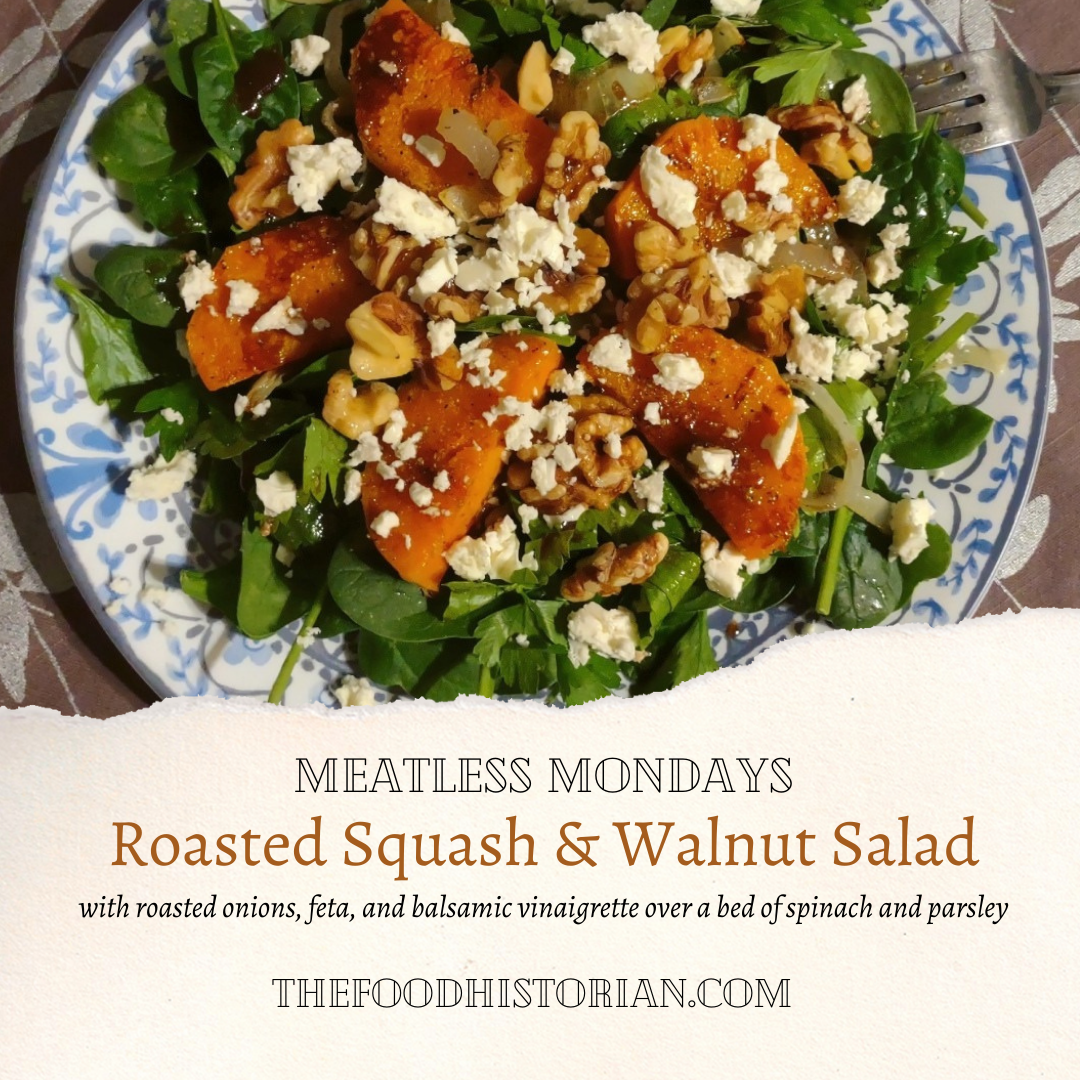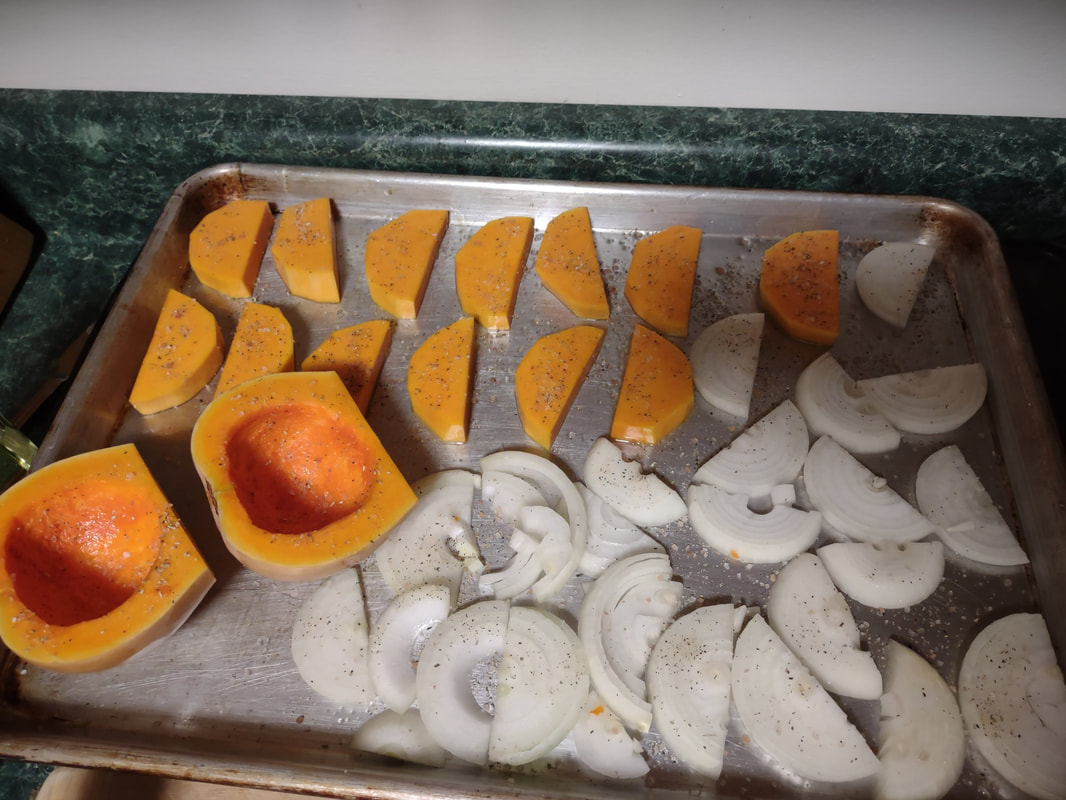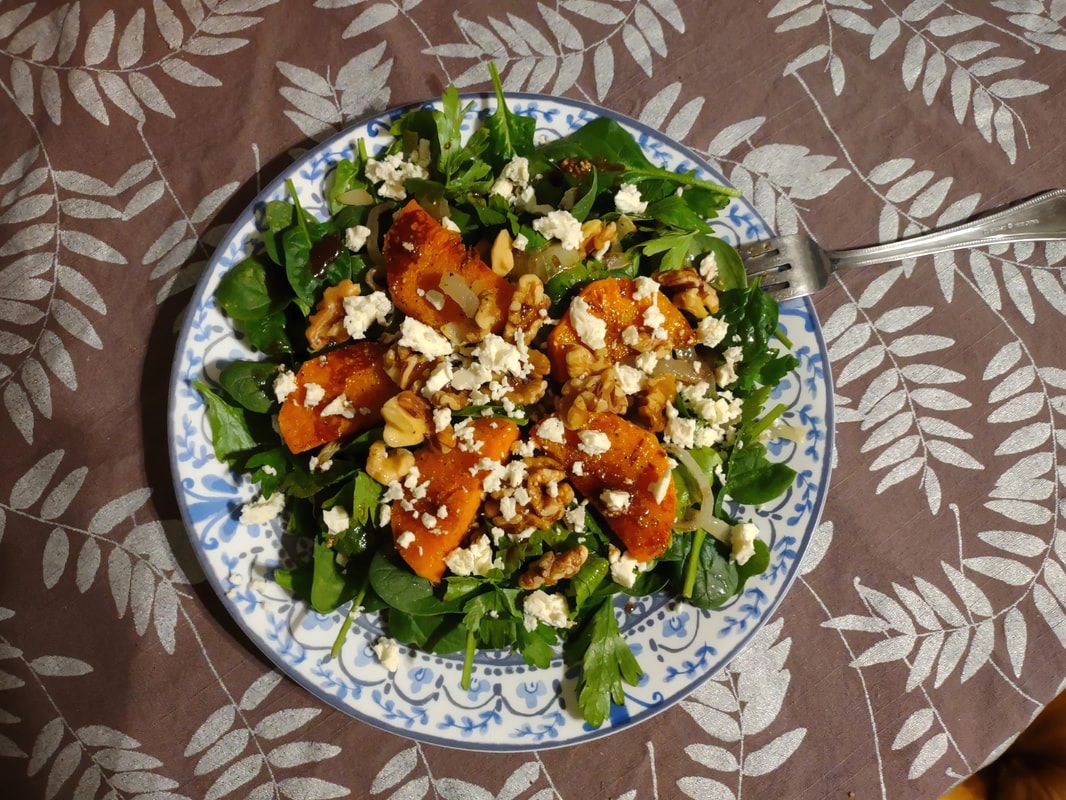|
It's the depths of January. And after months of holiday eating, life can feel depressingly uninspiring when it comes to food. But while the imported tropical fruits beckon, it is possible to make a perfectly delightful dinner out of foods that are (mostly) in season here in the northeast. Enter the butternut squash. I'm typically not a huge fan. Butternut squash soup is usually much too sweet. Mashed squash is insipid and mealy. But when a Patreon patron posted about making Emily Nunn's delicata squash salad with parsley and walnut vinaigrette and raved about it, I was intrigued. I didn't have delicata squash, just one lonely little butternut left over from my impulse buy Thanksgiving CSA haul. I did have a big bunch of parsley, but I think it got a little frosty in the frigid temperatures we've been having lately, so bits were crispy and wilted. It would take some sorting. I also had a bottle of walnut oil I'd bought last year, and mostly hadn't used, which was set to expire in February. In the fridge, half a block of the most deliciously creamy, salty, made-in-New-York cow's milk feta (the sheep's kind and I don't get along) was languishing. Inspiration was striking. I'm an inveterate tinkerer when it comes to cooking. Even the respected science of baking usually has me asking, can I put fruit in this? Can I substitute some whole grain flour? Do I really have to beat the eggs for three whole minutes? Even as I don't mess with the ratios otherwise. So it's no surprise that I would be clinically unable to replicate Emily's recipe as she wrote it. The bones were good, though, so I stuck to those. Here's what I came up with: Roasted Squash & Walnut SaladThis recipe seems complicated, but once the vegetables are cut and in the oven, it's a fair amount of waiting. You can do a pan of dishes or start a load of laundry or watch most of an episode of your favorite television show while you wait. 1 smallish butternut squash 2 smallish yellow storage onions walnut oil pink salt garlic powder black pepper dried sage walnuts feta (the good-quality, locally made wet kind) fresh flat leaf parsley fresh baby spinach balsamic vinegar Dijon mustard maple syrup Preheat the oven to 400 F. Generously coat a half sheet pan with walnut oil (you can use olive or canola, if you prefer). Wash butternut squash and cut neck into one inch rounds. Cut in half and with a sharp knife remove the peel. I left the bulb end, cut it in half, scooped out the seeds, and roasted the halves whole with the rounds. Flip the half moons of squash in the oil so they're well-coated. Peel and halve the onions, cut into rounds, and add to the oiled pan. Combine about 2 tablespoons of pink salt, at least a teaspoon of black pepper, a few shakes of garlic powder and dried sage, and sprinkle the mixture all over the squash and onions. Roast for 30 minutes, flip, season again if you like, and roast for another 10 minutes or so, until the squash is crispy on one side and very tender, and the onions are tender. Scatter a generous handful of walnuts across the pan and roast another 3-5 minutes, until the walnuts are fragrant. Meanwhile, assemble your plate with the baby spinach topped with just the whole leaves of washed and dried parsley. Make a vinaigrette of about 3 tablespoons walnut oil, 2-3 tablespoons balsamic vinegar, and 1 tablespoon each Dijon mustard and maple syrup (add more syrup or a tablespoon of water if it seems too sharp). Top the greens with slices of squash, onions, and walnuts, drizzle over the vinaigrette, crumble feta on top, and serve while the vegetables are still warm. This salad is divine. The butternut squash came out silky and rich, the onions soft and not-too-sweet, the walnuts pleasantly crunchy, the parsley added some fresh, grassy tones to the milder spinach, and the sweet-sharp balsamic vinaigrette tied everything together. There was one slice of butternut squash left on the pan, so I tried it with some of the leftover onions and walnuts (which I stuffed in the cavities of the squash halves with the rest of the vinaigrette, for lunch tomorrow). To be honest, the squash was so good I could have eaten it just like that. But it really added so much satisfying heft to the salad. I don't think I'll ever make butternut squash any other way again. It was too delicious this way, and I could see it being the star of any number of other salads as well. It's hard to find satisfying, fresh recipes for winter eating that don't involve ingredients flown in from thousands of miles away. And while I love the wintertime treat of beautiful citrus, it's nice to be able to make something so delicious out of locally grown storage foods, too. I hope you enjoy this recipe as much as I did! The Food Historian blog is supported by patrons on Patreon! Patrons help keep blog posts like this one free and available to the public. Join us for awesome members-only content like free digitized cookbooks from my personal collection, e-newsletter, and even snail mail from time to time! Don't like Patreon? Leave a tip!
1 Comment
Anna Katharine Mansfield
1/17/2022 02:24:51 pm
Om nom nom nom! I'm so glad you experimented with this- and it sounds delicious!
Reply
Your comment will be posted after it is approved.
Leave a Reply. |
AuthorSarah Wassberg Johnson has an MA in Public History from the University at Albany and studies early 20th century food history. Archives
July 2024
Categories
All
|




 RSS Feed
RSS Feed